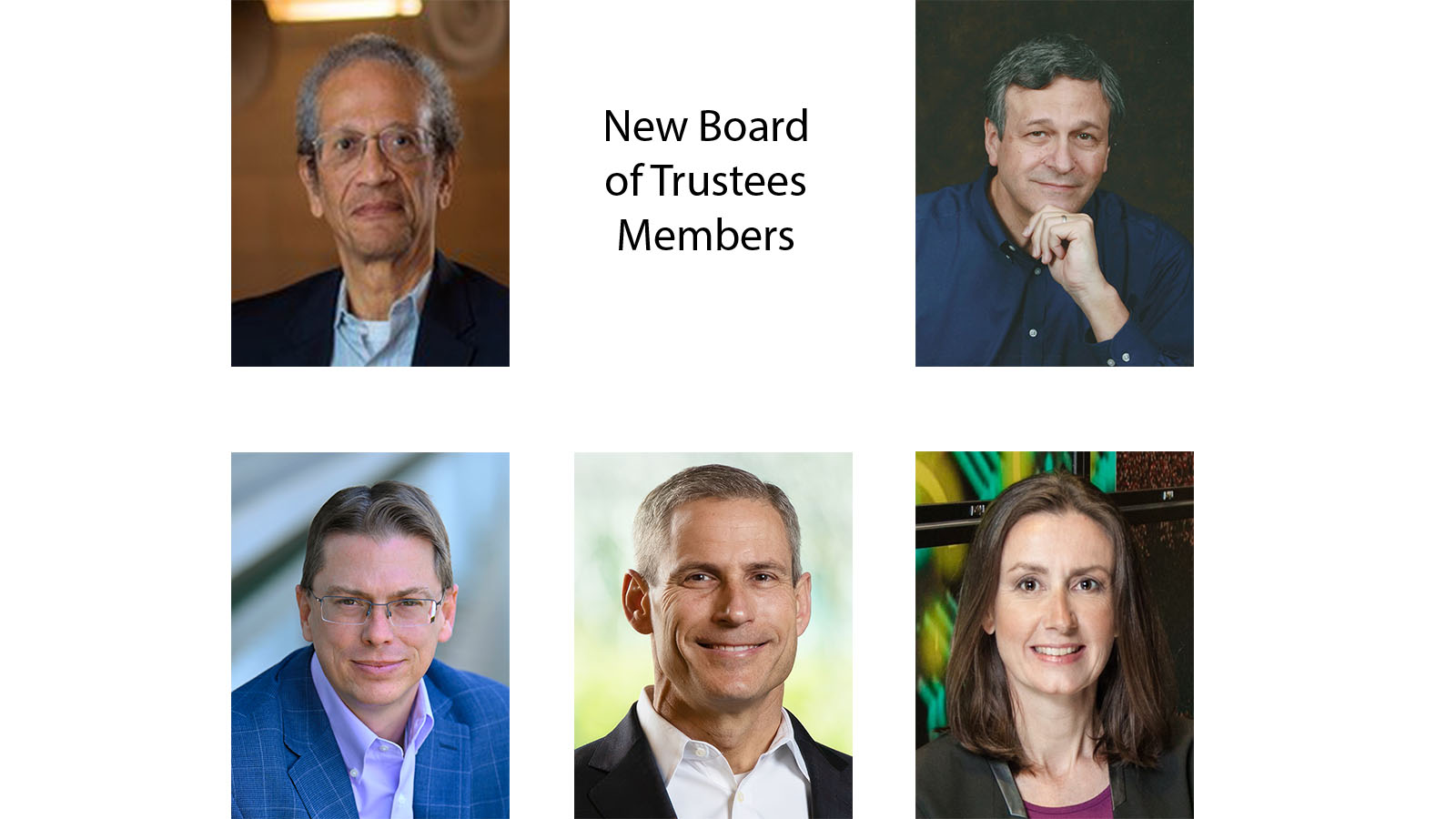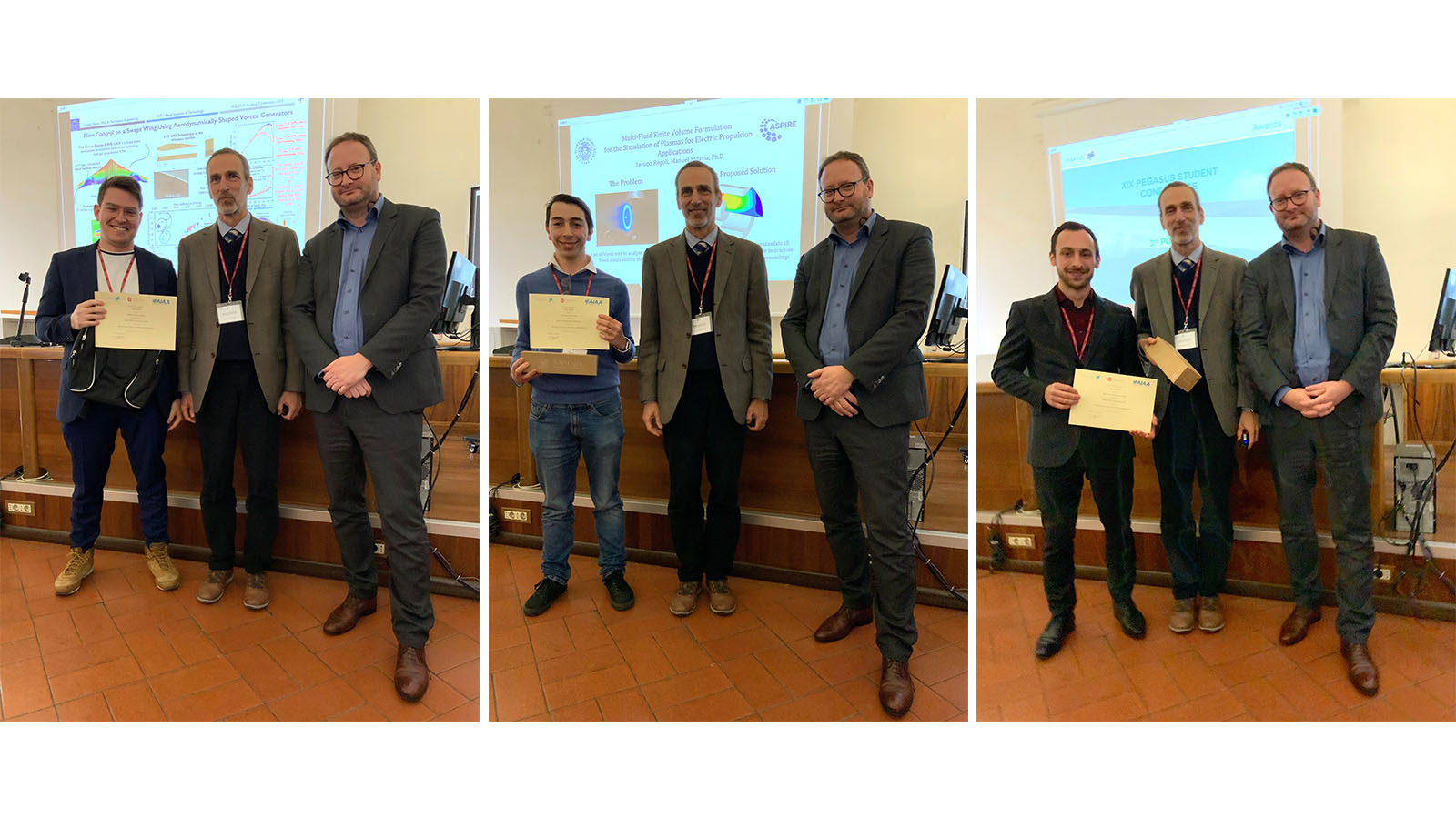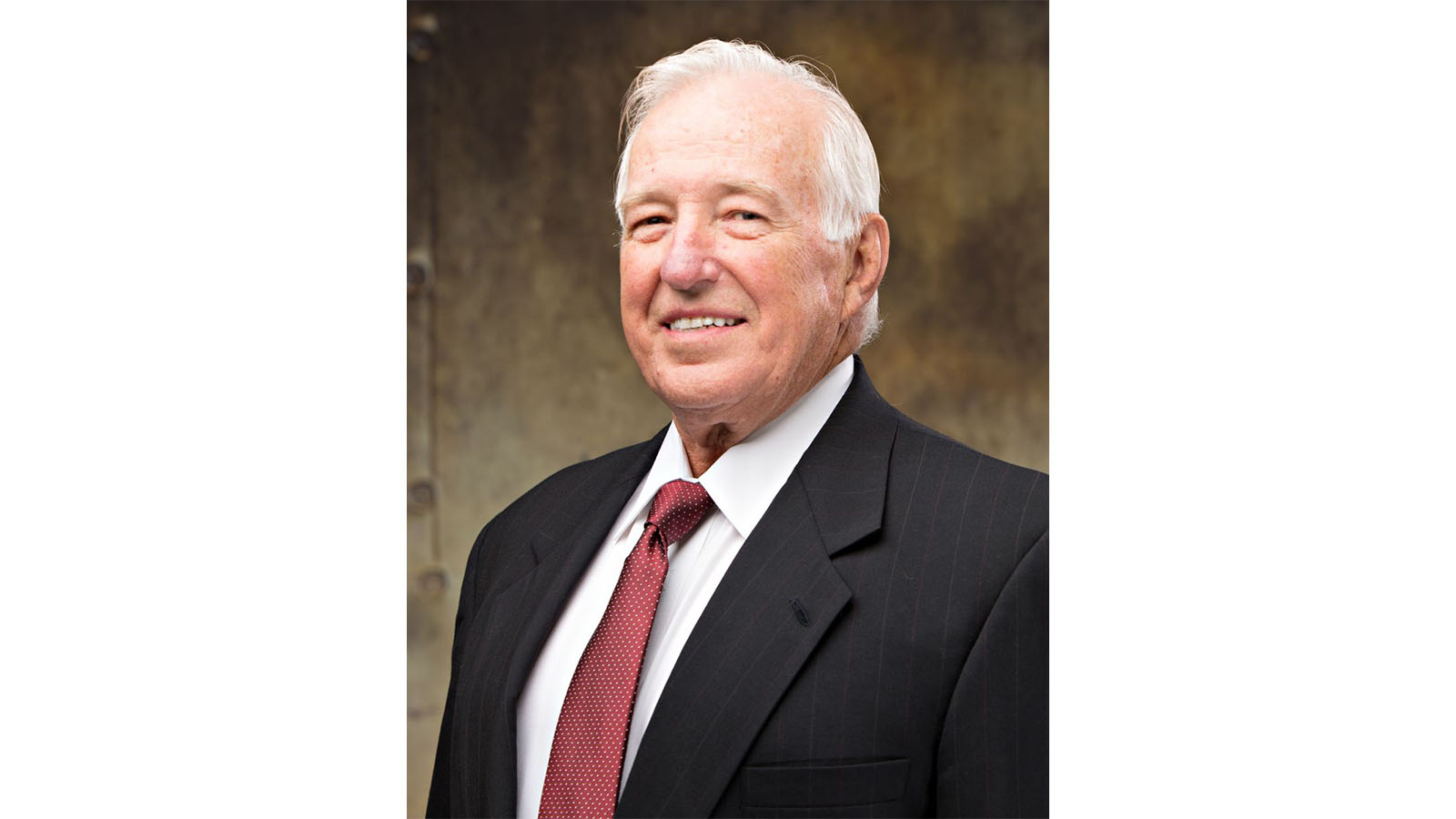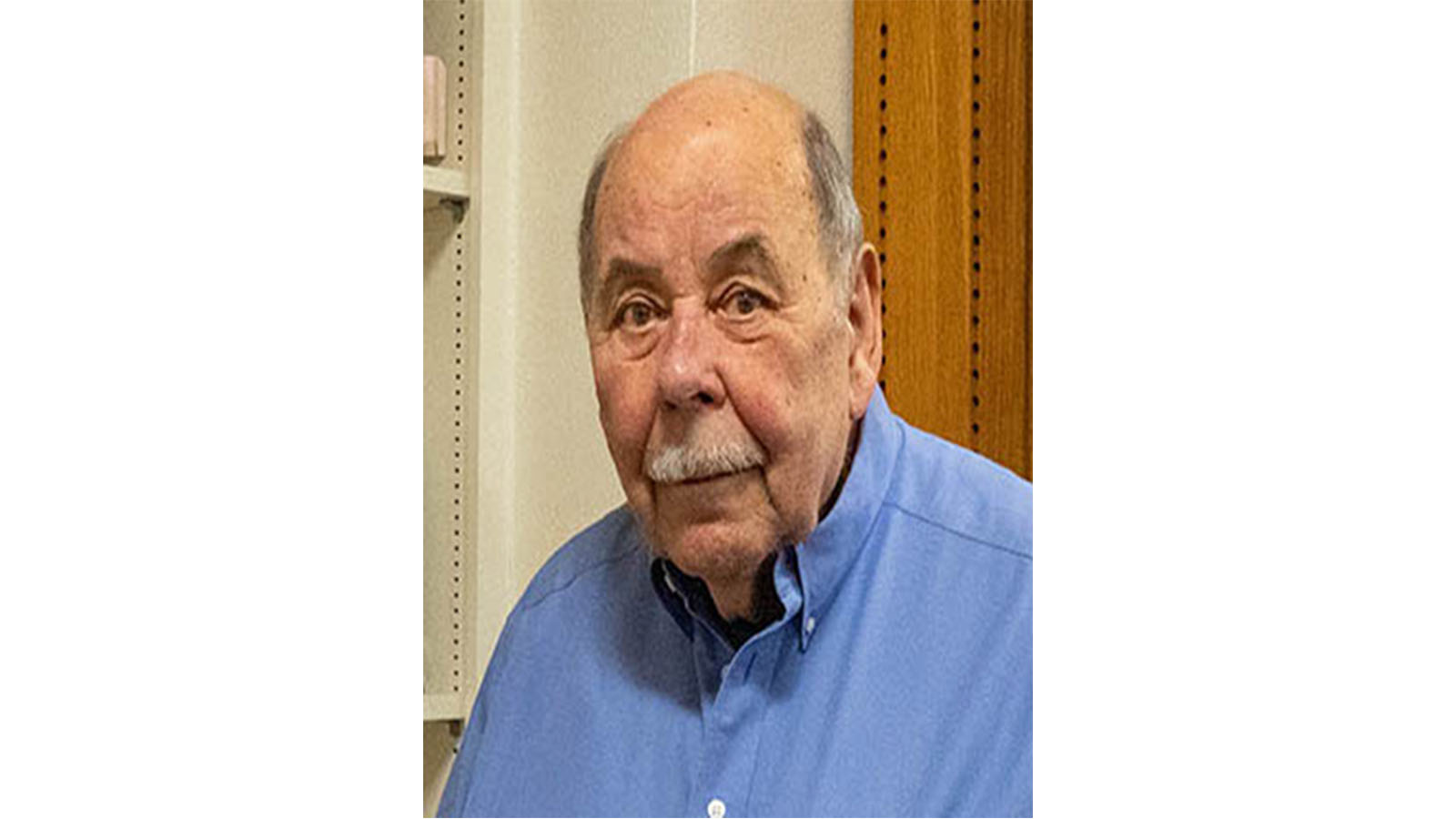Stay Up to Date
Submit your email address to receive the latest industry and Aerospace America news.

Introducing the New Board of Trustees Members
In May, the Board of Trustees (BoT) welcomed new members whose terms of office began at the end of the spring business meetings.
• Dan Hastings began his term as AIAA President-Elect (2023–2024). He will hold this position until May 2024, when he becomes President (2024–2026).
• Steve Justice (BoT Member–At Large) has been elected to the position of Treasurer-Elect. He will hold this position until May 2024, when he becomes Treasurer (2024–2027).
• Three new Board of Trustees Members–At-Large also began their three-year terms in May.
Johnathon Caldwell
Keoki Jackson
Karen Willcox
Get to Know Our New Board Members
President-Elect—Daniel E. Hastings, Department of Aeronautics and Astronautics, Massachusetts Institute of Technology
Hastings has been on the faculty at MIT in Aeronautics and Astronautics since 1985. His research specializations include synergetic interactions between space systems and the space environment, space propulsion, space policy, and space systems architecting. Among his external appointments, he served as chief scientist in the late 1990s for the U.S. Air Force, where he led studies of Air Force investments in space. He was also the chair of the Air Force Scientific Advisory Board afterward and has served on the NASA Advisory Council and on numerous NASEM committees. He has been on The Aerospace Corporation Board of Trustees for over 18 years.
Treasurer-Elect—Steve Justice, The Ginn Group
Justice has over 40 years of experience across innovation, entrepreneurship, economic development, engineering, and information technology in both the public and private sectors. He is currently the Chief Innovation Officer at The Ginn Group. In the public sector working for the State of Georgia, Justice served as the Executive Director of the Georgia Centers of Innovation leading a wide-ranging program to support the state’s strategic industries – Aerospace, Agribusiness, Energy Technology, Information Technology, Logistics, and Manufacturing. In the private sector, Justice provided technical and managerial leadership while serving at Lockheed Martin, Gulfstream Aerospace, Northrop, Delta Air Lines, Generation Orbit Launch Services, in addition to founding two Georgia-based aerospace companies. Justice is also the former Secretary of the Aerospace States Association, and long-time member of the Commemorative Air Force and the Experimental Aircraft Association.
Johnathon Caldwell, Lockheed Martin Space
Caldwell is the Vice President of Business Innovation Transformation & Enterprise Excellence for Lockheed Martin Space and serves on the Space Executive Leadership Team. Previously, he served as Vice President of the Navigation Systems mission area within Lockheed Martin’s Military Space line of business. Caldwell’s career includes a series of progressive leadership roles within Lockheed Martin serving in diverse roles from Global Positioning System (GPS) Program Leadership and Chief Engineer responsible for the overall GPS III Space Vehicle.
Keoki Jackson, The MITRE Corporation
Jackson is Senior Vice President and General Manager, MITRE National Security Sector, responsible for the strategic growth and execution of programs supporting Department of Defense, the Department of Justice, and the Intelligence Community. He also leads the National Security Engineering Center. Jackson joined MITRE after more than two decades at Lockheed Martin, where he influenced the design, development, deployment, and flight operation of major national security spacecraft and programs. Before joining Lockheed Martin, Jackson was a NASA research fellow at the Massachusetts Institute of Technology (MIT) in the field of human adaptation to the space environment. Jackson is a Fellow of the United Kingdom Royal Aeronautical Society and AIAA. He received his bachelor’s, master’s, and doctoral degrees in aeronautics and astronautics from MIT and completed the Stanford Executive Program at the Stanford Graduate School of Business.
Karen Willcox, University of Texas at Austin
Willcox is Director of the Oden Institute for Computational Engineering and Sciences, Associate Vice President for Research, and Professor of Aerospace Engineering and Engineering Mechanics at the University of Texas at Austin. She is also External Professor at the Santa Fe Institute. Before joining the Oden Institute in 2018, she spent 17 years as a professor at the Massachusetts Institute of Technology, where she served as the founding Co-Director of the MIT Center for Computational Engineering and the Associate Head of the MIT Department of Aeronautics and Astronautics. Prior to joining the MIT faculty, she worked at Boeing Phantom Works with the Blended-Wing-Body aircraft design group. She is a Fellow of the Society for Industrial and Applied Mathematics (SIAM), Fellow of AIAA, Fellow of the U.S. Association for Computational Mechanics (USACM), and member of the National Academy of Engineering (NAE).
Nominations for AIAA Election Are Being Accepted Through 14 July 2023
The Institute is currently seeking nominations for the following positions.
AIAA Board of Trustees – Members–At-Large Nominations
The AIAA Executive Nominating Committee (ENC) will compile a list of potential nominees for the Board of Trustees – Members–At-Large. The list will include nominees who will be selected to go to the next step of competency review and interview held by the nominating committee. The ENC will select specific candidates for the Institute’s Board of Trustees – Members–At-Large in November 2023. The Board of Trustees – Members–At-Large will be elected by the Council of Directors in March 2024 and announced soon thereafter.
The skills and competencies being sought for the Board of Trustees are:
Vision: Persons who have the ability to understand present states, clearly define what they should be in the future, and identify steps to achieve those ends.
Diverse Business Acumen: Persons who have the knowledge and understanding of the financial, accounting, marketing, communications, human resources, policy, and operational functions of an organization as well as the ability to make good judgments and quick decisions.
Domestic and International Aerospace Knowledge and Experience: Board membership reflects: a) the breadth of the various major sectors of aerospace both domestic and international; b) all levels of technology and systems development from basic research through all technology readiness levels to product development and deployment; and c) from different disciplines within aerospace.
Leadership/Strategy/Execution: Persons who have the ability to create a shared vision, obtain participation and buy-in, and achieve successful results.
AIAA Leadership and Participation: Board membership reflects experience in successful participation in a wide variety of leadership positions within AIAA, as well as knowledge of the governance model.
Experience in Adjacent Aerospace Areas: As the Institute broadens its reach beyond the traditional “Breguet Equation” disciplines, Board members who have experience and strategic perspectives in these adjacent areas will broaden the Board’s view on new and emerging areas.
Young Member Knowledge and Experience: As the Institute evolves, it is important that Board members have knowledge and understanding of issues relevant to young members in the aerospace industry.
Experience with Organizational Growth: Persons with experience in significantly growing organizations will serve as a resource to the Board as the Institute seeks to grow.
Experience with Change or Transition Management: Board members with prior experience in organizational change or transition will serve as a vital resource to the Board as it seeks to execute its role.
Demographic Diversity: In addition to reflecting the membership’s diversity in the industry and volunteer involvement, it is important that the new Board membership be seen as reflecting demographic diversity (e.g., gender, ethnicity, age, etc.) as well.
AIAA members may nominate qualified individuals for the AIAA Board of Trustees – Member–At-Large positions by submitting a nomination package of not more than three pages consisting of:
• Nominee’s Bio and/or CV and history of AIAA activities and/or engagement with other professional societies
• Statement from the nominee addressing how they meets the sought competencies
• Statement from the nominee of willingness and ability to serve if elected
AIAA Council of Directors Nominations
The AIAA Council of Directors Nominating Committee (CNC) will compile a list of potential nominees for the open Director positions on the AIAA Council of Directors. This list will include nominees who will be selected to go to the next step of competency review held by the nominating committee. The nominating committee will select specific candidates for the open Director positions who will be voted on by the AIAA membership. The final slate of candidates will be publicized by December 2023 for the election that will be held January 2024.
Nominations are being accepted for Regional Directors, Integration and Outreach Group Directors, and Technical Group Directors for the term May 2024–May 2027. AIAA members may self-nominate or nominate members qualified for the open position.
Regions coordinate the activities of geographically-related sections to facilitate cooperative efforts between the various geographical areas. A Regional Director shall lead each region. Nominations are being accepted for:
Region III – Central, Director
Region VI – Western, Director
For more information on AIAA regions and sections, visit aiaa.org/get-involved/regions-sections.
Integration and Outreach Groups coordinate the activities of related Integration and Outreach Committees to facilitate cooperative efforts between the various professional areas. Nominations are being accepted for:
Young Professionals Group, Director-Elect
For more information on AIAA integration and outreach, visit aiaa.org/get-involved/committees-groups/Integration-and-Outreach-Division-Committees.
Technical Groups coordinate the activities of related technical committees to facilitate cooperative efforts between the various technical disciplines. Nominations are being accepted for:
Aerospace Sciences Group, Director
Aerospace Design and Structures Group, Director
For more information on AIAA technical activities, visit aiaa.org/get-involved/committees-groups/ technical-committees.
Please go to AIAA Nominations and Elections to learn more and submit nominations no later than 14 July 2023, 1800 hrs ET.

Making an Impact: 2023 AIAA Design/Build/Fly Competition
AIAA held its 27th annual Design/Build/Fly (DBF) Competition 13–16 April at Tucson International Modelplex Park Association in Tucson, AZ. Eighty-one teams comprising 868 university students from 14 countries participated in the flyoff. This year’s flight objective was to design, build, and test an uncrewed aerial vehicle (UAV) to conduct surveillance and jamming missions for electronic warfare.
The 2023 DBF winners are:
First Place ($3,000): RWTH Aachen University, Germany
Second Place ($2,000): University of Ljubljana, Slovenia
Third Place ($1,500): Embry-Riddle Aeronautical University, Daytona Beach, Florida
Best Report Score ($100): University of Washington, Seattle
The success of DBF is thanks to the efforts of many volunteers from Raytheon Technologies, Textron Aviation, and the AIAA sponsoring technical committees: Applied Aerodynamics, Aircraft Design, Flight Test, and Design Engineering. 2024 AIAA DBF will be hosted by Textron in Wichita, KS, in April 2024; more information can be found at aiaa.org/dbf. For information on how your organization can engage with and sponsor this event, please contact [email protected].

PEGASUS Student Conference Winners Announced
AIAA supported the 19th PEGASUS Student Conference, 14–15 April, at the Sapienza University of Rome in Rome, Italy. This annual conference gives graduate students the opportunity to present their technical work. The first-, second- and third-place winners receive cash prizes from AIAA and the first-place winner will compete at the International Student Conference at the 2024 AIAA SciTech Forum, 8-12 January.
1st Place – “Flow Control on the Green Raven UAV Using Aerodynamically Shaped Vortex Generators,” Carlos Neves, KTH Royal Institute of Technology Stockholm
2nd Place – “Multi-Fluid Finite Volume Formulation for the Simulation of Plasmas for Electric Propulsion Applications, Iacopo Regoli, Università di Pisa
3rd Place – “Analysis of Collision Avoidance Manoeuvres Using Aerodynamic Drag for the Flying Laptop Satellite,” Fabrizio Turco, University of Stuttgart

Dayton/Cincinnati Section Gets a Tour of GE Aerospace’s Learning Center
On 6 May, members of the AIAA Dayton/Cincinnati Section got a tour of GE Aerospace’s Brian H. Rowe Learning Center in Evendale, OH. The tour included a museum of GE engines. Thanks to Gary C. Wollenweber, P.E., Consulting Engineer – Infrared Radiation and Thermal Design at GE Aerospace for the tour.
AIAA Public Review
AIAA S-157, In-Space Storable Fluid Transfer, has been issued for public review. This document provides the current industry best practices for development of prepared interfaces for in-space fluid transfer for storable propellants and other storable fluid commodities, including but not necessarily limited to: initial fueling, refueling and refilling. It is intended to provide guidance to developers and operators of both the servicer spacecraft and client spacecraft. Public review deadline is 16 July 2023. For a copy of the draft, submission of public review comments, or questions, please contact Nick Tongson ([email protected]).
Associate Fellow Rediess Died in July 2022
Herman A. Rediess died on 2 July 2022. He was 86.
Rediess received a Bachelor of Science with Honors in Mechanical Engineering from the University of California at Berkeley. He entered an engineering co-op program at the National Advisory Committee for Aeronautics (NACA) at Edwards Air Force Base.
Following graduation Rediess returned to Edwards AFB as a research engineer at the newly renamed NASA Flight Research Center (FRC). Most of his early career at NASA was focused on flight mechanics and control, working on the X-15 and F-100C Variable Stability Aircraft and other research aircraft. During this time, he pursued graduate studies at the University of Southern California, receiving a Master’s of Science in Aerospace Engineering in 1964. Rediess then took leave from NASA to pursue a Ph.D. in Aeronautics and Astronautics from MIT, receiving his doctorate in 1969, with a thesis entitled “A New Model Performance Index for the Engineering Design of Aircraft Control Systems.”
Following his return to NASA FRC in 1969, he rose through various leadership positions and ultimately served as Director of Research. In 1978, Rediess took a position at NASA Headquarters, overseeing all of NASA’s aeronautics research in avionics, controls and human factors. In 1984, he left NASA to head up a new division of HR Textron; this division was acquired by Sparta where he went on to become a Vice President. Following 12 years in private industry, he took a position at the FAA Technical Center in New Jersey as Chief Scientist for Test & Evaluation, and later led the Aviation Research Directorate at FAA Headquarters. Rediess finished his career at the Department of Homeland Security where he managed a Counter-Man Portable Air Defense Systems program among others.
Rediess was a member of the AIAA Management Technical Committee in the early 2000s, and he became an AIAA Associate Fellow in 2006.

AIAA Associate Fellow Wright Died in January 2023
Martin C.N. Wright died on 17 January 2023.
Wright received his BSc in Mechanical Engineering from University of Newcastle upon Tyne (1982); MSc in Aerodynamics from Cranfield University (1984); and his diploma, Advanced Systems Engineering from Salford University.
Wright worked as a section leader in Performance Analysis at British Aerospace Dynamics (1984–1989) before becoming senior project supervisor, performing commercial transonic, supersonic, and hypersonic wind tunnel testing at Aircraft Research Association.
In 1994, Wright joined the European Transonic Windtunnel (ETW), first as an aerodynamicist and senior test engineer, before becoming group leader of test products and design. Since 2015, he had been manager, Aerodynamics and Testing. His comprehensive experience and knowledge on general wind tunnel testing and strong understanding of high Reynolds number testing in particular, made him a well-known authority in the global ground testing community. He developed fundamental cryogenic testing methods and strategies and played a key role in establishing and serving the organization’s international user base. He significantly contributed to ETW’s outstanding capabilities and renowned reputation. For many users, Wright was the principal point of expertise and the main face at ETW.
Wright was a Class of 2020 Associate Fellow and a member of the AIAA Ground Testing Technical Committee.

AIAA Fellow Skelton Died in February 2023
Robert (Bob) E. Skelton, UC San Diego Distinguished Professor Emeritus of Mechanical and Aerospace Engineering, died 15 February.
Skelton received an electrical engineering degree from Clemson, a master’s from the University of Alabama, and a Ph.D. in Aeronautical and Astronautical Engineering from UCLA.
Working at NASA Marshall Space Flight Center, Skelton was integral to the design of control systems on Apollo, Skylab, the space shuttle, and the Hubble telescope. He was Professor of Aeronautics and Astronautics at Purdue for 22 years before joining UC San Diego in 1996.
At UC San Diego, Skelton architected the Dynamic Systems and Controls group in the Department of Mechanical and Aerospace Engineering. Under his targeted leadership, this group grew over two decades into one of the strongest academic modeling and controls programs in the country.
Skelton is broadly recognized as the principal pioneer in the field of tensegrity. His contributions were extensive, ranging from art, to architecture, to biology, physics and medicine, as well as to the building of bridges, large telescopes, space structures, and efficient-wave energy conversion systems in the ocean.
Skelton’s research group at University of California San Diego studied structural systems and control, focusing specifically on the design, analysis, and control of tensegrity systems, a mathematically elegant yet innately practical research paradigm related to lightweight controllable structures. Skelton’s book, Tensegrity Systems, coauthored with Maurício de Oliveira, provides a powerful mathematical formalism to understand the statics and dynamics of tensegrity systems.
Skelton was an inspired researcher and a visionary architect of both novel mathematical ideas and effective new organizations, as well as of lightweight controllable mechanical structures. He was one of the first in his field to adopt a fundamentally interdisciplinary approach to academic research in control theory and its applications. He retired in from UC San Diego in 2009, and continued doing research as emeritus faculty until 2014. Skelton spent seven additional years as a Distinguished Research Professor in Aerospace Engineering at Texas A&M.
He wrote four textbooks and published over 200 journal articles, and received numerous awards across many different engineering disciplines in Civil, Electrical, Aeronautical & Astronautical, and Mechanical Engineering. He was inducted into the National Academy of Engineering in 2012, and he was the inaugural holder of the Daniel L. Alspach Endowed Chair in Dynamic Systems & Control at UC San Diego.
Skelton was a life Fellow of the Institute of Electrical and Electronics Engineers (IEEE), a Fellow of AIAA and the American Astronautical Society (AAS), and a life member of the Alexander von Humboldt Foundation. His major awards include: the SKYLAB Achievement Award, the Japan Society for the Promotion of Science Award, the Humboldt Foundation Senior US Scientist Award, the Norman Medal from the American Society of Civil Engineers, the Humboldt Foundation Research Award, and the NASA Appreciation Award. He also received the 2017 AIAA Mechanics and Control of Flight Award.

AIAA Associate Fellow Wilson Died in April 2023
Don Wilson, associate chair of the Department of Mechanical and Aerospace Engineering at the University of Texas at Arlington (UTA), died on 11 April.
He earned a Bachelor of Science in aerospace engineering from Georgia Tech, a Master of Science in aerospace engineering from the University of Tennessee and a Ph.D. in aerospace engineering from UTA in 1973.
Before his career in academia, Wilson was involved in the development of electric arc heaters and MHD accelerators for hypersonic wind tunnel applications at the Air Force Arnold Engineering Development Center, and in the development of supersonic aircraft inlets at LTV Aerospace and Defense Company.
He joined the faculty at UTA in 1968 as an assistant professor in the Department of Mechanical and Aerospace Engineering. He became a professor in 1983 and served as department chair from 1997 to 2003.
He established the UTA Aerodynamics Research Center and was involved in the development of its numerous test facilities. He directed the NASA/UTA Center for Hypersonic Research from 1993 to 1997 and also initiated UTA’s detonation wave engine research programs in 1994. Wilson spent two summers at NASA Lewis (now Glenn) Research Center as a NASA/ASEE Faculty Fellow. He was also actively involved in the NASA/DOE National MHD Power Generator Program.
Wilson had over 50 years of experience in the fields of gas dynamics, high-speed aerodynamics and propulsion.
Joining AIAA in 1965, he was a well-known volunteer, serving as a member of the AIAA Hypersonic Technologies and Aerospace Planes Technical Committee and as chair of the Education and Outreach Sub-Committee. He was awarded the AIAA Ground Testing Award in 2001.
Stay Up to Date
Submit your email address to receive the latest industry and Aerospace America news.




